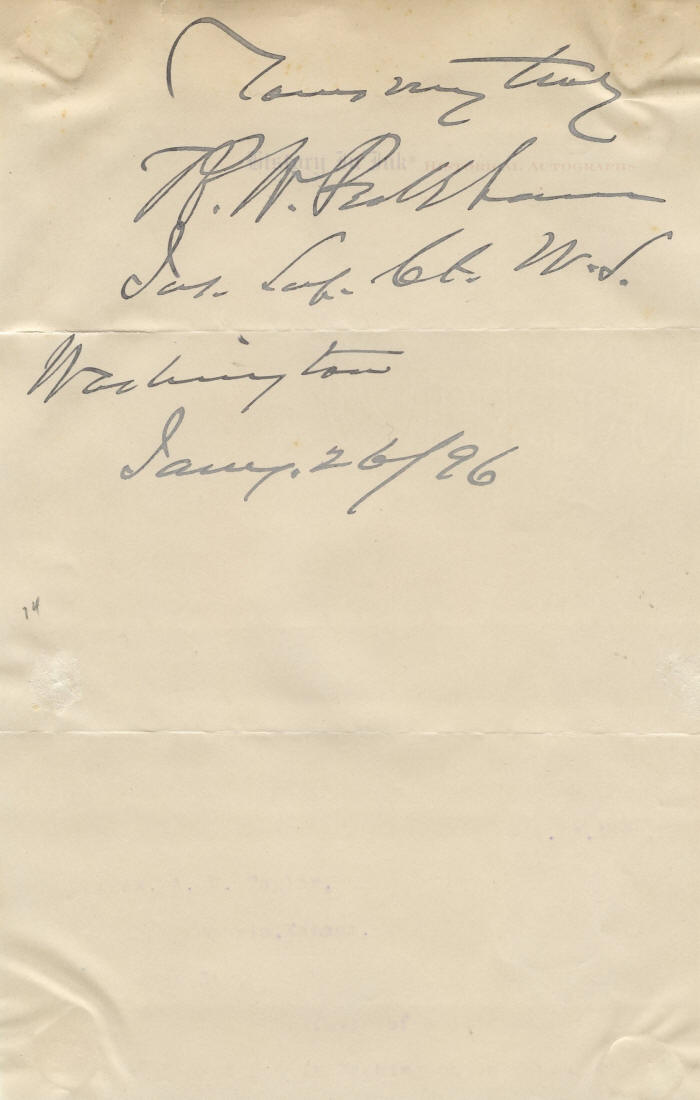1007393
Rufus W. Peckham
Scroll down to see the image of the item below the description
Peckham sends a note only 20 days after taking his seat on the Supreme Court
Rufus Wheeler Peckham, 1838–1909. Associate Justice, United States Supreme Court, 1895–1909. Autograph Note Signed, R. W. Peckham, one page, 5¾" x 9", on plain stationery, Washington, [D.C.], January 26, 1896.
Less than three weeks after he took his seat on the Supreme Court, Justice Peckham apparently sends his autograph. He writes, “Yours very truly / R. W. Peckham / Jus. Sup. Ct. U.S. / Washington / Jany. 26 / 96."
Peckham was commissioned December 5, 1895, and was sworn in as an Associate Justice on January 6, 1896, only 20 days before he signed this piece. His appointment to the Supreme Court came at the end of a tug of war between President Grover Cleveland and New York Senator David B. Hill. Cleveland initially nominated Peckhamʼs older brother, Wheeler Hazard Peckham, to succeed deceased Justice Samuel Blatchford in 1893. But the nomination drew fire from Hill, who opposed it because of Wheeler Peckhamʼs campaign against a New York machine politician. The Senate defeated the nomination by a 41–32 vote. Cleveland then appointed Senator Edward Douglass White of Louisiana, who later became Chief Justice. When Justice Howell E. Jackson died in 1895, Cleveland turned to Rufus W. Peckham, a New York Democrat and a member of the New York Court of Appeals, the stateʼs highest court. By then Hillʼs influence had waned, and the Senate easily confirmed the appointment.
Although he was a Democrat, Peckham had strong ties to business giants J. Pierpont Morgan, Cornelius Vanderbilt, and John D. Rockefeller, and those relationships likely colored his pro-business views. Peckham accepted the laissez-faire economics that gave rise to the doctrine of substantive due process under which the Supreme Court, citing freedom of contract, routinely invalidated labor regulation under the 14th Amendment Due Process Clause. Peckham wrote the Courtʼs opinion in Lochner v. New York, 198 U.S. 45 (1905), which struck down a New York law limiting the number of hours that bakers could work per day and per week. Justice Oliver Wendell Holmes, Jr., dissented, arguing that the "Fourteenth Amendment does not embody Mr. Herbert Spencerʼs Social Statics.” Lochner gave its name to an era that stymied progressive legislation for more than 30 years. It was finally discredited in 1937, during the later days of the Great Depression.
Peckham has written and signed this note in black. Two horizontal folds do not touch either the text or Peckham's signature. The piece has mounting traces on the back from prior mounting in an album, a couple of thinner places from removal from the album, and a small collector's number in pencil in the blank area at the left margin. A fold split at the left end of the top fold has been archivally repaired. Overall the piece is in fine condition and a bold example of Peckhamʼs holograph.
Unframed.
This item has been sold.







